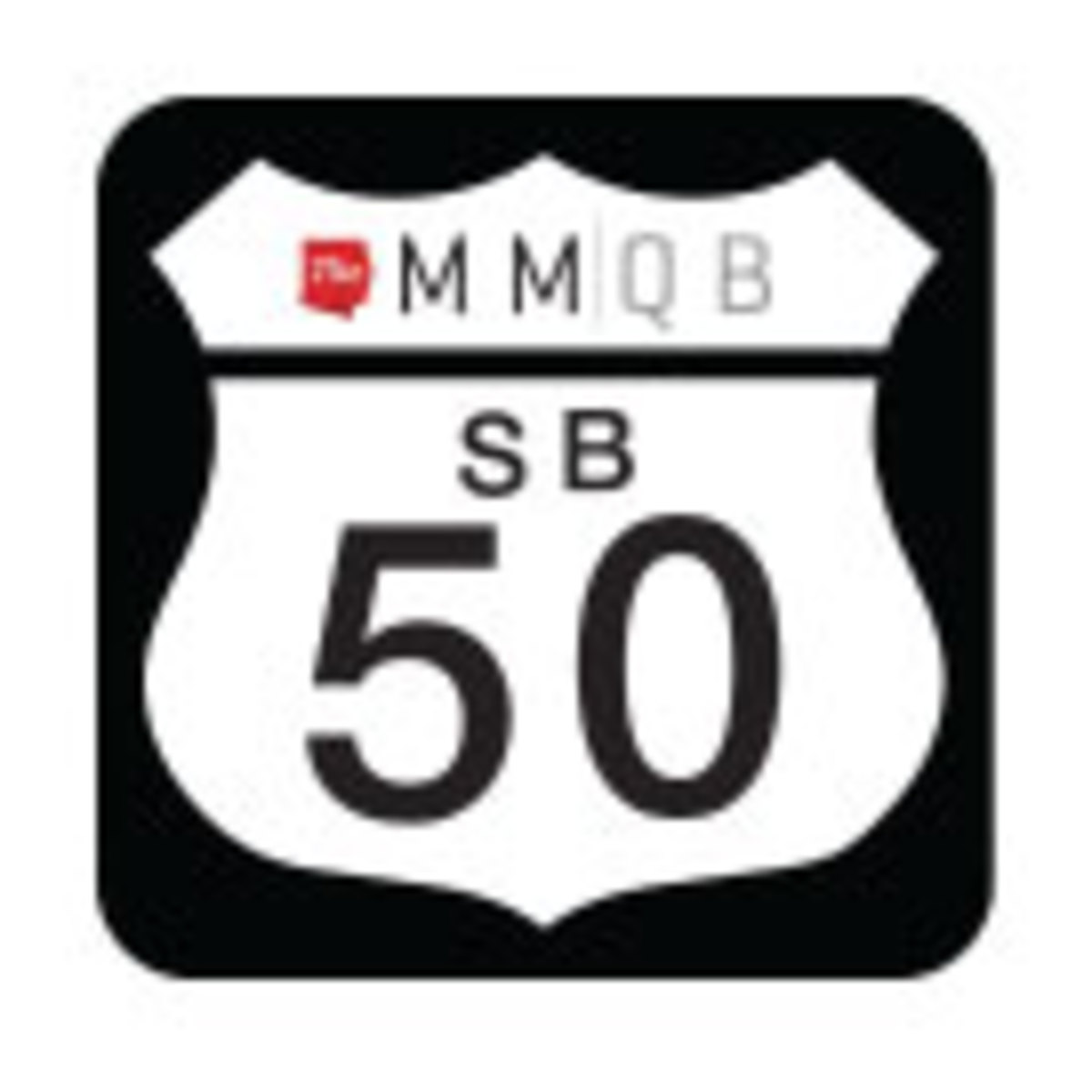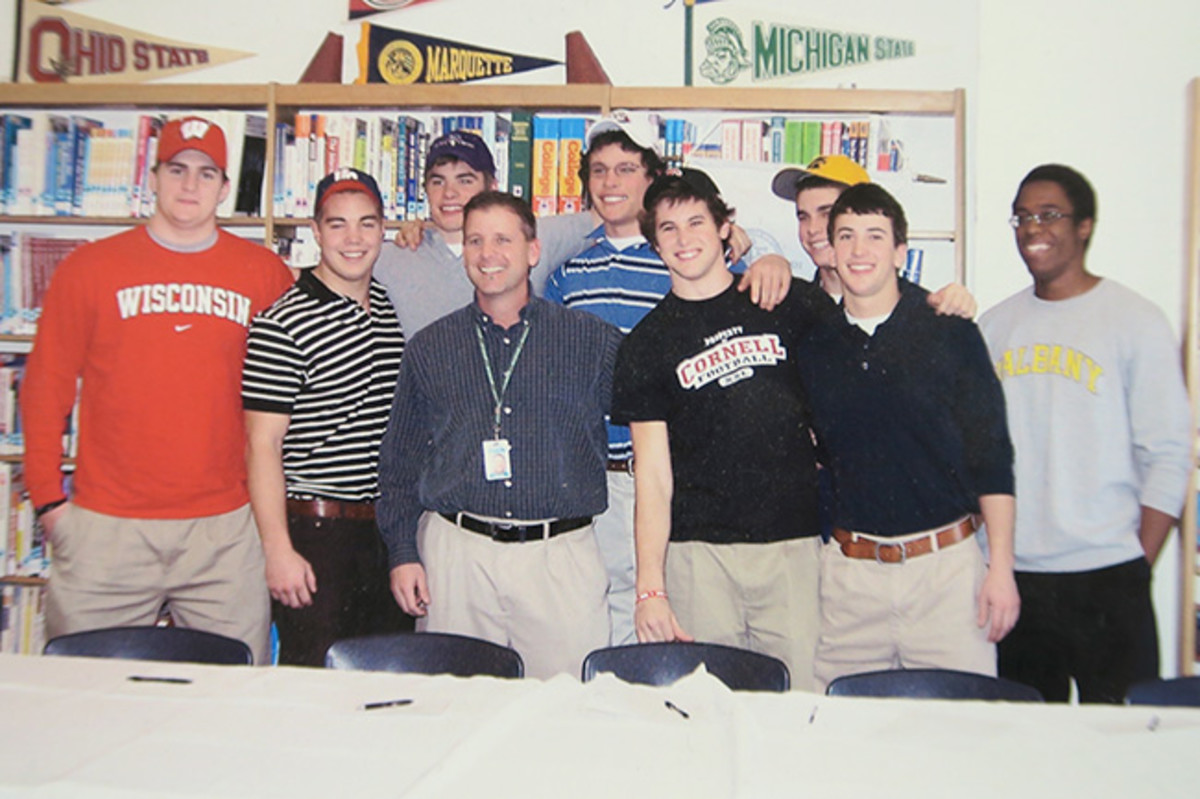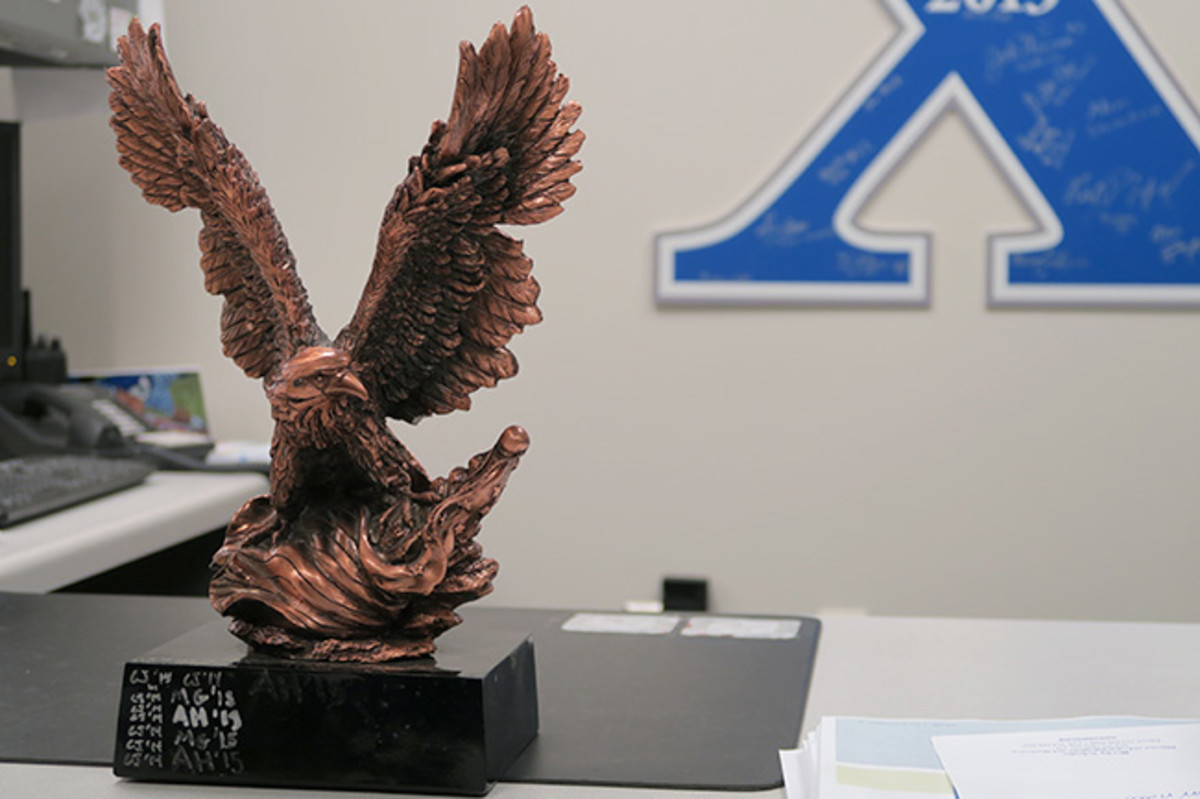The Gentleman Linebacker


For the next two weeks The MMQB will be on the road to Super Bowl 50, telling stories of the game’s history and the Panthers-Broncos matchup, meeting notable Super Bowl figures and exploring what the game means to America, from coast to coast. Follow the journey on Twitter and Instagram (#SB50RoadTrip), as well as at The MMQB’s Facebook page. And if you see us on the road, give a wave.
CINCINNATI — Walking into St. Xavier High School, you are greeted by Pope Francis. If any reminder is needed of the expectations at this private Jesuit school on the north side of the city, nothing does the trick quite like a framed photo of the leader of the Catholic Church.
Farther inside are a display case presenting mission trips for students; an art gallery; a bulletin board posting the students accepted into the 18 AP classes next school year (the offerings include Chinese, Spanish literature and 2-D design). If you’re standing in the hallway between periods, expect to hear a chorus of “excuse me, ma’am” and “pardon me, sir” as the student body of 1,600 boys, clad in the dress code of khakis and polo shirts, head to their next classroom in another part of the sprawling 110-acre campus.
Anyone who has gone to school here is considered part of the “Long Blue Line,” an alumni network that extends to the clergy, the military, academia, Wall Street—as well as an alumnus from the class of 2009 who will be one of the most feared men on the field in Super Bowl 50: Panthers linebacker Luke Kuechly.
“Luke was a nice boy,” says St. Xavier football coach Steve Specht, “until he crossed that line. He could flip that switch like no one I ever coached. He could literally take on a new persona on the field. It’s an interesting case study.”
Cam Newton may have cornered the national market on the Superman identity, but here at St. Xavier they refer to Kuechly as Clark Kent. There’s an uncanny resemblance, with Kuechly’s tuft of dark hair and the wire-rimmed glasses he wears off the field, and the fact that he is polite, clean-cut and mild-mannered—until he puts on his football uniform.
The MMQB’s Road to Super Bowl 50 spent a morning at Kuechly’s alma mater, seeking the origin of the heat-seeking missile style of play that has made him the point for the Panthers’ intimidating defense.
* * *

St. Xavier, the largest all-boys Jesuit prep school in the country, has a five-figure annual tuition cost and a full-time communications and marketing director. Becky Schulte is her name, and since the Panthers won Sunday’s NFC Championship Game, which included Kuechly’s second pick-six in as many weeks, her phone has been ringing non-stop. CBS visited on Tuesday, The MMQB on Wednesday—and Super Bowl 50 is still 11 days away.
“When you meet Luke,” Specht says, “you’re never going to guess, that guy is a vicious linebacker.”
Not that Schulte has to twist anyone’s arm to get them to talk about Kuechly. They all get in line: Specht. Tim McDonald, his linebackers coach and defensive coordinator. Jim Telles, Kuechly’s morality-social justice teacher. They chuckle at the dichotomy between Kuechly’s prep-school persona and the relentless competitor who makes his living fighting through blocks, lowering his shoulder and snapping his hips to drive back ball-carriers.
Telles came into the classroom with the college recommendation letter he had written for Kuechly. As a part of the morality-social justice class, Kuechly spent a year volunteering once a week at a school with mentally and physically disabled kids—counting with them, coloring, wheeling them down the hallway to the gymnasium. In the letter, he wrote about how he watched Kuechly working with the kids gently and with great empathy. “In closing I would like to say that as a person, as a maturing young man, Luke Kuechly is respectful, polite, hardworking, intelligent, and honest—a young man of integrity,” Telles wrote.
Gentleness, politeness—not the first attributes associated with a hard-hitting linebacker whose job depends upon not letting an opposing player run past him. Before the NFC Championship Game, McDonald paused his TV to take a screen shot of Kuechly during the national anthem. From the way Kuechly was swaying back and forth to release his energy, and that look in his eyes, his old coach could tell he’d already made that action-hero transformation.
His St. Xavier coaches got to know it well during Kuechly’s years playing for them. His junior season, the fall of 2007, Specht thought his defense was missing a piece. He’s a defensive-minded coach, so he always puts the best athletes on that side of the ball, and the way he and his coaches pick linebackers is by tabbing the guys who would always be around the ball if they were just playing sandlot football. That was Luke Kuechly. They put the former tight end at weak-side linebacker, and he would end up making plays on the strong side, too, the same way that he pinballs sideline to sideline in the NFL today.
After each game, McDonald has a years-old tradition of giving out a “Ballhawk Trophy”—an old copper basketball trophy that’s shaped like an eagle hawk—to the linebacker who made the most impact plays. “Luke won it, like, 14 of the 15 games that year,” McDonald says. St. Xavier finished a perfect 15-0 that season, including winning the Ohio state championship against Mentor, a high school near Cleveland.
In the state final, Mentor quarterback Bart Tanski, who had been named Ohio’s Mr. Football a few days earlier, was running a zone-read up the sideline when Kuechly snaked his hand in and ripped the ball out of his grasp. To Kuechly’s chagrin, one of his senior teammates was awarded the Ballhawk Trophy instead that week. After watching the NFC Championship Game, and seeing that second consecutive pick-six, McDonald texted Kuechly: I guess you are the true ballhawk.
The following season, Kuechly’s senior year, St. Xavier opened with a win against New Jersey’s Don Bosco Prep, the top-ranked team in the nation. Now playing from a position called “the adjustor,” a hybrid safety/linebacker who stands in the middle of the field and tracks everybody down, Kuechly recorded 26 tackles that day (coincidentally, the same number he had in a 2013 game to set an NFL record). The season slid, though, after injuries to their starting quarterback and running back. A loss in the regular-season finale cost St. Xavier a playoff berth. Long after the game ended, Specht found Kuechly on a pitch-black field, sobbing so hard his shoulders were shaking. Not because of one game, but because it meant the end of his St. Xavier career.
* * *

There’s a standing rule in the Kuechly household: All three of their sons’ interests and achievements are treated the same. So before Henry, the youngest of the Kuechly boys and a senior at St. Xavier, could agree to a media request, he had to ask his parents. They granted him permission, but Henry put one condition on the interview: He had to be done by 9:15 a.m., not a minute later, because he did not want to be late for a meeting with his math teacher.
The oldest of the Kuechly boys, John, was a senior reserve offensive lineman on that ’07 state championship team. He’s an officer in the Army Reserve and is working at the family-owned business, J&N Auto Electric, while completing his MBA at Xavier University. Henry, seven years younger than Luke, never played tackle football. In first grade he learned he had an ear condition, enlarged vestibular aqueduct, that carries a risk of him going deaf if he gets hit too hard in the head. Instead, he’s a forward on St. Xavier’s basketball team and is planning to major in pre-medicine when he goes to college this fall.
The Kuechlys emphasize politeness and manners in their household. Every fall since Luke graduated, his dad, Tom, brings Specht a bag full of hundreds of DVDs for the current players to burn their high school highlights for colleges, a thank you for all the discs Specht made for Luke. (Specht so appreciated the gesture, he didn’t have the heart to tell Tom when the highlights switched to digital.) But boys will be boys, and Henry knows first-hand how his big brother could flip the switch when it came time for competition. And everything is a competition between three brothers.
They used to play a game in the upstairs hallway of their house, where they’d hide in a bedroom, and when another one walked past, they’d jump out and tackle them into the sliding closet doors on the other side of the wall. (“Those always got broken,” Henry says matter-of-factly.) So what does he think now about the fact that his big brother is one of the most feared linebackers in the game?
“I mean, I see where they are coming from,” Henry says, a grin starting to peek out, “because one time he tackled me and gave me a partially cracked rib at my grandma’s house.”
Say what?
“I kind of deserved it because I was egging him on,” Henry continues. “He was sitting in a rocking chair, and I was sitting on the ground, saying, ‘You won’t hit me,’ and then he just sprang out of the chair and tackled me. I felt the consequences. It wasn’t, like, a serious cracked rib, but it still hurt.”
(Roman Harper, the veteran Panthers safety who suffered a dislodged cornea after Kuechly accidentally collided with him on a tackle attempt last Sunday, can relate.)
“When I think of Ray Lewis, I think he’s one of the best linebackers ever,” Henry says. “But when I think of Luke, I just think he’s my older brother, playing a game.”
With that, it was 9:15, and Henry was off to that meeting with his math teacher, walking down the same hallways plastered with Jesuit teachings (“strive for the magis”) that his brother did seven years ago. Back then, Luke was a gangly kid, a Catholic player from Ohio whom Specht couldn’t convince Notre Dame or Ohio State to recruit. He ended up at Boston College, where he was a two-time consensus All-America and the 2011 winner of the Butkus, Lombardi and Nagurski awards. That Clark Kent look can be deceiving.
“When you meet Luke,” Specht says, “you’re never going to guess, that guy is a vicious linebacker.” Now, of course, his cover has been blown.
